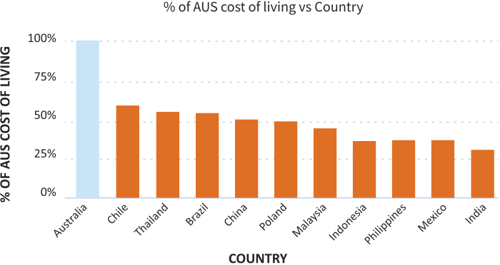8 reasons the right people for your business are in the Philippines
Outsourcing part of your business can be tricky, particularly if you’re looking overseas—or “offshoring”. Recruitment is hard enough locally, let alone in another country that you might know very little about. It’s not just the on-paper qualifications that make positions tricky to fill. It’s also the more subtle, personal qualities and values.

Even so, more and more companies are outsourcing to the Philippines and experiencing great results. In fact it’s ranked in the world's top 10 for offshoring destinations.
Why? What makes the Philippines such a great location? Short answer - it’s the people.
Here are 8 reasons why you’ll find your perfect offshoring match in the Philippines.
-
Communication: speaking the same language
Your primary concern when it comes to offshoring has to be communication—both between your offshore staff and your clients, and between your onshore and offshore teams. Successful offshoring starts with a communication plan and that's really much easier when you speak the same language.
The Philippines is in the high proficiency band for English, ranking 14th in the world according to EF PI ratings. That’s in the same group as high-income countries like Switzerland. It’s higher than India, which comes in at number 28, Chile at 46 and Brazil at 53. (The highest level is where you’ll find Sweden, the Netherlands and Singapore).
English is one of the Philippines’ official national languages. In fact, 75 million Filipinos speak English, making them the world’s third-largest population of native English speakers.
When it comes to a good foundation for setting up offshore, language cannot be overlooked and if you start with the Philippines, it’s a barrier you can quickly cross off your list.
-
A similar outlook
Cultural similarity can play a big role in your offshoring success. If the gap between your culture and that of your offshore team is too great, it can lead to performance issues and misunderstandings.
As a former colony of the U.S. (and, prior to that, of Spain), the Philippines is in many ways culturally similar to a lot of Western countries. If you were to visit Manila, you would, for instance, find the architecture familiar, as well as the lifestyle.
But it goes deeper than that. The Philippines scores five stars in terms of cultural compatibility with the United States, according to Gartner’s research. And the Hofstede model, a well-respected cultural analysis tool, shows the Philippines also shares many of the same values when it comes to doing business. For example, the United States and the Philippines both focus on performance, growth and profit, and both value reward for effort, achievement, assertiveness and success. Both countries embrace change and creativity, looking for different and new ways to achieve efficiency and better systems. They also score the same when it comes to the balance between short- and long-term outlook.
This is important when you’re offshoring because the people you’re taking on are just as much a part of your company as those in your onshore office. And while diversity is extremely beneficial, it also helps to have some commonly held goals and aspirations, so you can pull together as a team and ultimately work together efficiently and without added barriers.
-
A commitment to your business
“Malasakit” is a Filipino word which has no direct translation into English, but which broadly means to care for something or someone like it’s one’s own. It’s a concept that exists broadly across Filipino culture and also specifically within the workplace, as businesses who have already taken the step of offshoring in the Philippines can attest to. And it’s exactly the kind of work ethic you want in an employee - whether at home or abroad.
It’s also important to understand that family is a cultural focal point of Filipino life. An employee is working not just for their own financial and professional gain, but also to support immediate and extended family. If you provide a job worth having, you’ll be rewarded with the loyalty that you’re looking for in a workforce and are unlikely to find in more individualistic cultures.
-
Service-oriented
Customer service can make or break your reputation and that is why the Philippines, which brands itself as having a “service-oriented culture, high productivity … advanced language and analytics skills, a superior quality of life, and loyalty”, is the obvious place to find the level of service you’re looking for.
As Fred Ayala, the former chair of the IT & Business Process Association of the Philippines (IBPAP), told an International Outsourcing Summit: “We serve the world and the world is better for it.” Start digging for information about Filipino culture and the word “hospitality” will appear countless times. Caring about the needs of others is a cultural practice that permeates all levels of society, dating back long before colonial times and remarked upon by all who have the privilege of experiencing it.
Perhaps unsurprisingly, the Philippines economy has done well out of tourism and countless large multinational American and Australian companies have invested in customer service personnel and training in the Philippines for decades. In 2016, for example, 16 of the top 20 offshore call center projects were located there. All of that adds up to a Philippines labor market that’s rich in skilled customer service talent.
-
A large, highly educated talent pool
The Philippines provides an exceptionally high standard of education. More than 680,000 Filipinos complete university each year and with more than 41 million highly trained people in the workforce, the talent pool in the Philippines is deep and rich.
When it comes to Philippines outsourcing, you can offshore almost any position from customer service agents to mobile app designers, and you can also fill roles vertically, from entry- and mid-level right up to senior and executive levels.
The value gained from outsourcing to the Philippines is possibly the world’s worst-kept secret and when you understand a little more about the culture and the people, it’s easy to see why.
-
Low cost of labor and living costs
Money talks and that is why onshore executives light up when they learn exceptionally low living and occupancy costs in the Philippines are about 70% lower than in the U.S. and Australia, a fact driven home in this comparison of the top 10 offshoring destinations:

Graphic Source: Why Outsource To The Philippines | MicroSourcingAs you can see, the nation is towards the lower end of the scale in terms of cost of living. Just as importantly, outsource to the Philippines and you will help improve the lives of your offshore staff. While the average monthly disposable income in the Philippines is U.S. $373 compared to $3,258.85 in the US, the average compensation in the BPO sector is still more than double the average wage in the Philippines. The outsourcing industry has clearly had an enormously beneficial impact on the local population by providing long-term, fulfilling career opportunities that would otherwise have been unavailable to them.
-
Time on their side
Employing an offshore team in another time zone is a fast-track to gaining a competitive advantage. Making the most of what is essentially another workday allows organizations to offer around-the-clock service and deliver projects faster, which is good news for both your onshore staff and clients. The Philippines is in a similar time zone to Australia (the same as Perth and only two hours behind Sydney), which has benefits for companies Down Under and those further afield looking to expand their 24/7 customer service offering.
Another reason the outsourcing industry is booming in the Philippines is its people are extremely flexible when it comes to time. Filipino employees are willing to work shifts in the early morning, at night and on holidays if it helps accommodate the needs of their onshore colleagues. A typical working week is 40 hours in the major cities and many providers will provide the additional flexibility of 4 x 11-hour shifts to provide coverage across multiple time zones.
-
Government support
The value of the outsourcing sector to the Philippines cannot be understated, hence why the nation’s government has invested so heavily in making it one of its economic pillars and main revenue generators. The business process outsourcing (BPO) sector is the country’s third largest after tourism and foreign inbound remittances, representing about 3.5% of services sector employment and at least $11 billion of annual revenues.
The Filipino Government’s commitment extends to providing strong support and infrastructure for BPOs and businesses setting up offshore teams, with industry initiatives including:- Partnerships with universities to create BPO-specific curricula to prepare the future BPO workforce
- A voucher system from the Technical Education and Skills Development Authority (TESDA) as funding support for call center training
- Tax and non-tax incentives to support foreign investment, and
- Creation of the National Information and Communications Technology Council.
Why the Philippines?
To find out why the Philippines is one of the best offshore destinations for global teams, read this blog.
This blog was updated on February 8, 2022.
Popular posts
Browse by topic
- Accounting
- Accounting & Finance
- All Industries
- Banking
- BPO/RPO/HRO
- Communication
- CSR & ESG
- Customer & Client Acquisition
- Customer Experience
- Cybersecurity
- Cybersecurity & Compliance
- Data Management
- Digital Operations
- Digital Transformation
- eCommerce
- Education
- Employee Engagement
- Engineering & Construction
- Financial Services
- Healthcare
- Hospitality and tourism
- HR & Recruitment
- Information Technology
- Insurance
- Legal Services
- Logistics
- Offshoring & Outsourcing
- Outsourcing
- Professional Services
- Real Estate
- Retail & eCommerce
- Startups
- Talent Acquisition and Retention
- Technology
- Trends & Guides
- Workforce Integration
Related Posts
How employers can reduce healthcare costs
A lot has been written about how the working world has changed in the wake of the COVID-19 pandemic. Where many managers once linked productivity..
Defining data – the difference between data privacy, data security and data protection
There is no shortage of issues that can inspire sleepless nights for business leaders. Talent shortages, regulatory pressures, shrinking budgets and..
Is offshore staffing the key to data compliance?
With entire websites dedicated to exposing businesses daily that have been hacked or have had their data breached daily, it’s no wonder why data..
